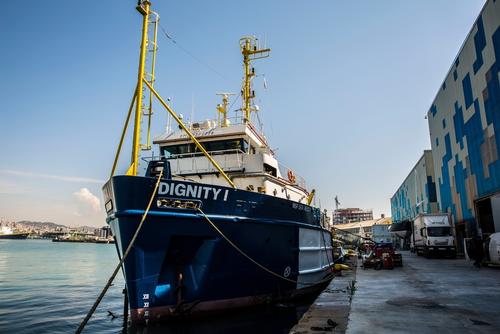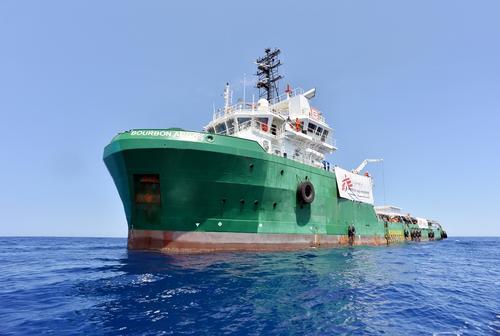- Thousands of migrants and asylum seekers are currently stranded in precarious conditions across islands such as Kos and Lesbos
- The current situation is a violation of Greece's and the EU's obligations towards asylum seekers and migrants in Greece, and requires an urgent response
- UNHCR needs to step up its response in delivering humanitarian assistance in the Greek islands
Brussels/Athens - Thousands of migrants and asylum seekers are currently stranded in precarious conditions across several Greek islands, despite repeated calls since December 2014 by Médecins Sans Frontières (MSF) to Greek authorities and the EU to address the lack of reception capacity. An MSF emergency response team has arrived in Lesbos - one of the two islands in Greece that actually has organised reception facilities, but where the system is on the edge of collapse. MSF is also continuing its existing activities for migrants and asylum seekers arriving in Kos and other Dodecanese islands.
Approximately 5000 people, mainly from Syria, Afghanistan and Iraq, have arrived to Lesbos in the last few days. However, the existing Moria reception facility can only accommodate around 700 people, and suffers from overcrowding, poor hygiene conditions and lack of food. Thousands of new arrivals are therefore forced to camp out in the open, most of them in Kara Tepe - a plot of land without any form of management and where people have little or no access to water, shelter, latrines or medical care. Despite efforts by authorities to distribute food, the rations are insufficient to cover the needs of all people.
In Kos, where MSF provides medical and humanitarian assistance to people arriving on the island, 700 people are sleeping on the floor among rubble and shattered glass in an old dilapidated building with a capacity of maximum 200. MSF medical teams are regularly receiving patients that are suffering from conditions such as scabies and skin infections - a direct result of unhygienic living conditions. Despite MSF’s efforts to clean and improve the water and sanitation provision, conditions can only be significantly improved by action and willingness by the local authorities to address the situation.
“While MSF and other organisations can assist in the humanitarian response, the efficiency and impact of any relief efforts will be seriously hampered by the failure to provide and maintain an adequate reception system” says Stathis Kyroussis, MSF’s Head of Mission in Greece. “The current situation is a violation of Greece's and the EU's obligations towards asylum seekers and migrants in Greece. Given the deep economic crisis that Greece is facing, it cannot be assumed that Greece can cope with this alone. The EU and its member states should urgently deploy humanitarian resources such as emergency funding and material assistance to support Greece in responding to the basic needs of newly arrived migrants and asylum seekers. UNHCR also needs to take direct responsibility, translate their words into real action, and step up its response in delivering humanitarian assistance” added Kyroussis.
“Leaving people to fend for themselves in an abandoned building or a field full of garbage where there is hardly any water or latrines is simply unacceptable and is putting people's health at risk” says Elisabetta Faga, MSF Emergency Coordinator in Lesbos. “Greek authorities should provide additional places under administrative responsibility of the state, where humanitarian assistance, such as food, shelter, sanitation and medical care can be provided also by other organisations. Authorities also need to ensure that efficient registration procedures are put in place, and that new arrivals are provided with information about what to do and where to go.”
MSF plans to soon provide medical consultations, cleaning services and relief items and work on improving water and sanitation in the Kara Tepe and Moria camps. MSF has already begun providing bus transportation so new arrivals do not need to walk the seventy kilometre distance from arrival points on the north coast to the registration centre in Mitilini.
Since March, MSF has been providing medical care and distributing relief items to migrants arriving in the Dodecanese islands. Currently on Kos Island, MSF provides medical consultations and distributes relief items. Since mid-March, MSF has carried out 2750 consultations and has distributed more than 20,000 non-food items items such as soaps, combs, toothbrushes and towels. MSF has also started mobile clinics around the Dodecanese islands through a boat that visits smaller island locations where people arrive from Turkey. MSF has provided 256 consultations through this mobile boat clinic since activities began in June.
In Idomeni, close to the border with FYROM (Former Yugoslavian Republic of Macedonia), MSF is running mobile clinics and distributing relief items for those who first arrive in Greece and continue crossing the Balkans to go to northern Europe. Since 1 April, MSF has provided consultations to 2403 persons, and distributed relief items such as hygienic products, energy food, blankets and socks.





